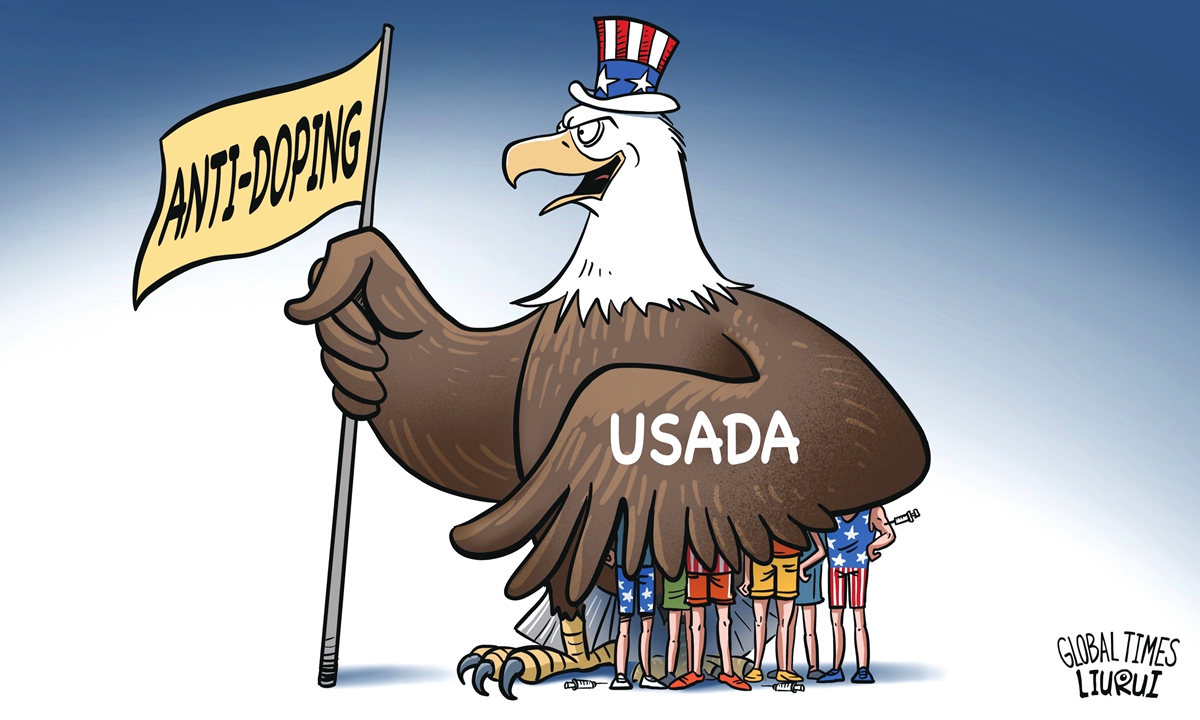
Illustration: Liu Rui/GT
The Olympics is supposed to be a competition that transcends borders and cultures, and stands for equality and fairness. Although we could witness touching moments of friendship that rise above wins, losses and national boundaries, it is becoming increasingly clear that major power rivalries are encroaching upon the Games, largely driven by the anxieties of once-dominant countries.
Even top US scholars admit this. "In this Olympics, as in most other races in the world today, there are two - and only two - superpowers: China and the United States," wrote Graham Allison from the Harvard Kennedy School in The National Interest. He added that China's rise, from essentially nowhere to become the leading rival of the US in the Olympics, mirrors its rise in virtually every other dimension to become the defining geopolitical rival in the 21st century.
He made a point. Zheng Qinwen claimed China's first tennis singles gold medal in Olympic history; Pan Zhanle set a new world record as he stormed to victory in the men's 100-meter freestyle final; and the China swim team made history by ending the US dominance of the 4x100m medley relay to take gold. For some time, Western countries, especially the US, have displayed that they are on top in athleticism, technology and national strength in these sports. However, this is no longer the case.
Western countries, especially the US, are unwilling to see China's rise in sports, as well as in other aspects. This has led to an absurd scene in Olympic history: The US media continuously questions the integrity of Chinese swim athletes, despite them being proven clean after undergoing 200 drug tests in just 10 days. Meanwhile, they ignore the visibly purple faces of the US swim team. Why don't they question if US approach to competing in the Olympics is clean and justified?
Just as how the US suppresses China's leading high-tech company, Huawei, it is also doing the same in sports by weaponizing drug testing to hinder China's rise in swimming.
On one hand, there is no credible explanation as to why the faces of the US swim team turned so unbelievably purple. It is even more mysterious when the US Embassy in China posted color-adjusted photos to celebrate the team's success at the Paris Olympics.
On the other hand, even though the Chinese swim team underwent the most frequent testing, there is still skepticism about the cleanliness of their results. Some US media outlets have shown a certain hysteria, as if there must be loopholes in China's achievements, and they believe that they have not yet interfered with Chinese athletes strongly enough. This is the reality that Chinese athletes face in competitive sports, much like the challenges China faces during its rise.
Fortunately, in various competitions, the Paris Games have shown China's overall rapid rise in sports. Chinese athletes show that solid strength is the core and foundation of everything. In events invented and dominated by Europeans and Americans, under rules set by Westerners, and with deliberate stumbling blocks made by the US, Chinese young people steadily advance from adversity to success through their own efforts.
They distinguish themselves from previous generations by shedding traditional restraints, confidently embracing their achievements and courageously confronting injustice and prejudice.
Pan said, "to those who look down on us, we've taken them all down." Chinese butterfly queen Zhang Yufei asked, "Why are Chinese athletes questioned when they swim so fast? Why didn't anyone dare to question Phelps when he won?"
Today, their voices have been heard. The World Anti-Doping Agency has issued a stern rebuke to the US Anti-Doping Agency (USADA), exposing a scheme that allowed US athletes who had committed doping violations to compete without sanctions for years.
The Paris Games comes to an end, but the game surrounding the global doping control mechanism may have only just begun. It is time for the US to clarify if it has utilized its national power to protect athletes who use drugs yet pretend to be innocent in global competition. We will see in future events whether testing frequencies will be fair across all countries, and if the double standards and shameless practices of USADA will be seriously addressed, especially in the Los Angeles Olympic Games in 2028.
The fairness of international competitive sports is under scrutiny, with rules allowing only a few countries to dominate increasingly challenged. This trend extends beyond sports to broader global competition. While more struggles are ahead, the confident, honest and open-minded Chinese youth who reject hegemony and prove themselves through their strength offer a hopeful perspective.
The author is a reporter with the Global Times. opinion@globaltimes.com.cn




